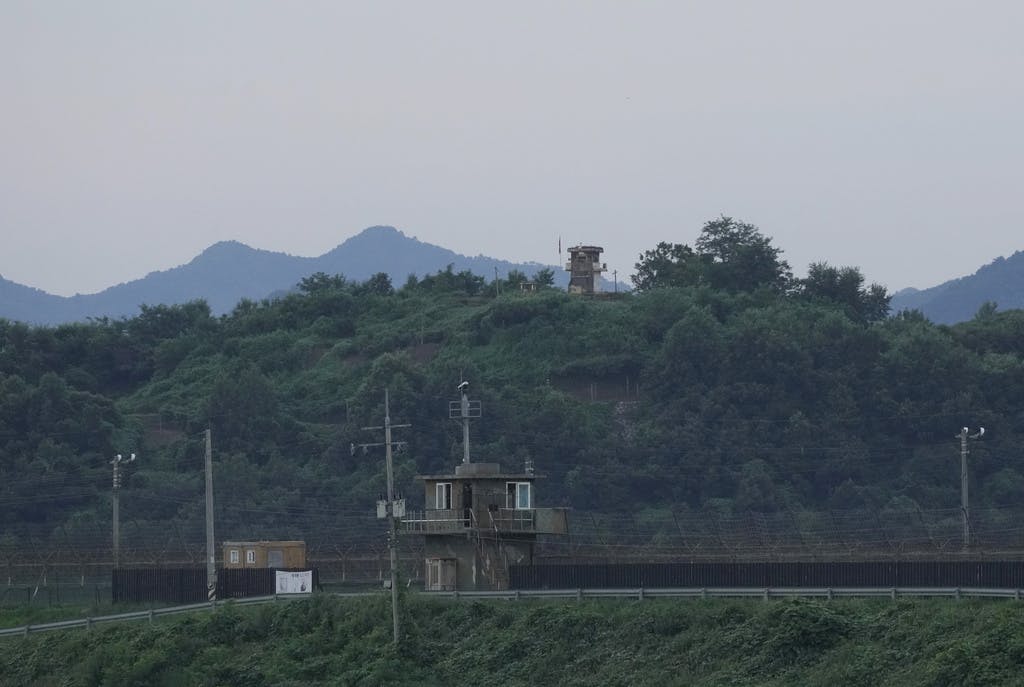North Korea Detains American Soldier Who Crossed the Border in Apparent Defection
A retired American army officer tells the Sun the North Koreans would have ‘no reason’ to cooperate considering that Private King had crossed the line of his own volition.

For the first time in more than 40 years, an American soldier has defected into North Korea.
On a routine tour of the joint security area on the North-South line at Panmunjom, 40 miles north of Seoul, the soldier bolted from his group and disappeared on the North Korean side.
The U.S. Forces Korea command issued a statement acknowledging that a “U.S. national on a JSA orientation tour” had crossed the line that has divided the two Koreas since the Korean War armistice was signed at Panmunjom 70 years ago this month.
The command did not name the soldier, but he was widely reported to be an American Army private, Travis King. The statement added vaguely that the command was “working with our KPA counterparts” — a reference to the Korean People’s Army — “to resolve this incident.”
If history is any guide, there’s no realistic possibility of the North returning the soldier in a time of tightening tensions on the Korean peninsula. The last American Army defector to the North, a private named Joseph White, made it there from a guard post near Panmunjom in August 1982. North Korea reported he died in a drowning accident three years later.
A retired American Army officer who has visited the North-South line many times over the years, Steve Tharp, told the Sun the North Koreans would have “no reason” to cooperate considering that Mr. King had crossed the line of his own volition. He said it might be many years, if ever, before he’s returned to the South.
The question is how Mr. King had gotten away from the group when it would have been under tight military escort by American and South Korean soldiers. None of them were armed, under terms of a “comprehensive military agreement” signed by North and South in 2018, but they all should have been alert to any sign of unusual movement by a member of the group.
A Swedish woman in the group, Mikaela Johansson, described the defection on Facebook.
As quoted by NK News, a website at Seoul, the woman wrote, “To our right, we hear a loud HA-HA-HA and one guy from OUR GROUP that has been with us all day- runs in between two of the buildings and over to the other side!!” she wrote.
Ms. Johansson wrote, “It took everybody a second to react and grasp what had actually happened.” Then, she said, “we were ordered into and through Freedom House” — the large building on the south side of the line — “and running back to our military bus.”
Mr. Tharp predicted the defection would result in the shutdown of the tours while American and South Korean officers figure out how to tighten security.
“The guards move along shadowing the tour,” he said. “They’re in front and in the back.”
The North Koreans, he said, have remained out of sight on their side since the onset of Covid, which North Korea has blamed on the disease wafting across the line from the South.
The defection overshadowed what would otherwise have been the top Korean story of the day — the arrival of the American nuclear submarine the USS Kentucky at the huge southeastern Korean port of Busan.
It was the first time a nuclear submarine had docked in South Korea since 1981, at a time of rising tensions between Washington and Seoul in the wake of the revolt in May 1980 at Gwangju, in southwestern Korea, in which upward of 200 demonstrators, mostly young activists, were killed.
The arrival of the submarine, in the aftermath of the latest test by North Korea of a long-range ballistic missile, reflected close cooperation between American and Korean commands since the election of the conservative Yoon Suk-yeol as South Korean president more than a year ago.
At the time of the defection, the U.S. Forces Korea command had already issued a press release proudly heralding the arrival of the Kentucky. “This demonstrates the flexibility, survivability, readiness, resolve, and capability of the U.S. Navy submarine forces,” said the release.
The port visit, it said, “reflects the United States’ ironclad commitment to the Republic of Korea for our extended deterrence guarantee, and complements the many exercises, training, operations, and the other military cooperation activities conducted by Strategic Forces to ensure they are available and ready to operate around the globe at any time.”

